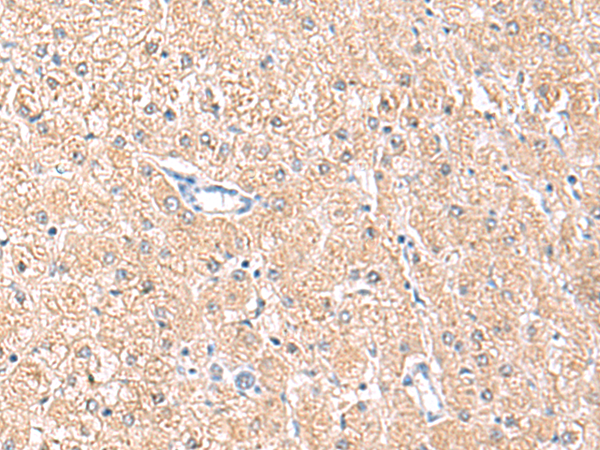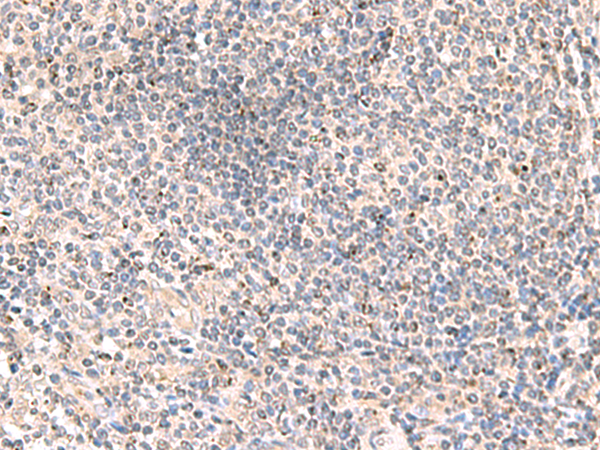

| WB | 咨询技术 | Human,Mouse,Rat |
| IF | 咨询技术 | Human,Mouse,Rat |
| IHC | 1/50-1/300 | Human,Mouse,Rat |
| ICC | 技术咨询 | Human,Mouse,Rat |
| FCM | 咨询技术 | Human,Mouse,Rat |
| Elisa | 1/5000-1/10000 | Human,Mouse,Rat |
| Aliases | hMLKL |
| Host/Isotype | Rabbit IgG |
| Antibody Type | Primary antibody |
| Storage | Store at 4°C short term. Aliquot and store at -20°C long term. Avoid freeze/thaw cycles. |
| Species Reactivity | Human |
| Immunogen | Fusion protein of human MLKL |
| Formulation | Purified antibody in PBS with 0.05% sodium azide and 50% glycerol. |
+ +
以下是3篇与MLKL抗体相关的重要文献概览:
---
1. **文献名称**:*Mixed lineage kinase domain-like protein mediates necrosis signaling downstream of RIP3 kinase*
**作者**:Murphy, J.M., et al. (Nature, 2013)
**摘要**:该研究阐明了MLKL在RIP3激酶下游介导坏死性凋亡的分子机制,利用特异性MLKL抗体验证了其磷酸化激活状态及在细胞膜上的聚集,证实MLKL是坏死执行的关键蛋白。
---
2. **文献名称**:*The pseudokinase MLKL mediates necroptosis via a molecular switch mechanism*
**作者**:Cai, Z., et al. (Immunity, 2014)
**摘要**:通过结构生物学和抗体互作实验,揭示MLKL从“惰性”到“激活”的构象变化。研究采用MLKL抗体检测其寡聚化,证明该过程是触发细胞膜破坏的关键步骤。
---
3. **文献名称**:*Plasma membrane translocation of trimerized MLKL protein is required for TNF-induced necroptosis*
**作者**:Chen, X., et al. (Nature Cell Biology, 2014)
**摘要**:利用MLKL特异性抗体追踪其在TNF诱导的坏死性凋亡中的亚细胞定位,发现MLKL三聚化及膜转位是坏死发生的必要条件,抗体阻断实验进一步验证其功能。
---
4. **文献名称**:*A novel monoclonal antibody reveals a conformational activation switch on MLKL*
**作者**:Tanzer, M.C., et al. (Cell Death & Differentiation, 2016)
**摘要**:开发了一种新型MLKL单克隆抗体,特异性识别MLKL激活后的构象表位。该抗体用于区分生理和病理状态下MLKL的活化状态,为坏死性凋亡的检测提供工具。
---
这些研究均依赖MLKL抗体的特异性识别功能,用于揭示其激活机制、结构变化或疾病关联。如需具体引用格式或更多文献,可进一步补充关键词或时间范围。
**Background of MLKL Antibodies**
MLKL (Mixed Lineage Kinase Domain-Like) antibodies are essential tools for studying necroptosis, a form of regulated cell death with features of both apoptosis and necrosis. MLKL serves as the terminal executor of necroptosis, acting downstream of RIPK3 (Receptor-Interacting Protein Kinase 3). Upon phosphorylation by RIPK3. MLKL undergoes conformational changes, leading to its oligomerization and translocation to the plasma membrane, where it disrupts membrane integrity, causing cell death and inflammatory responses.
MLKL antibodies are widely used to detect MLKL expression, phosphorylation status, and subcellular localization in various experimental models. They enable researchers to investigate necroptosis in diseases such as cancer, neurodegenerative disorders, and inflammatory conditions. Commonly employed in techniques like Western blotting, immunohistochemistry (IHC), and immunofluorescence (IF), these antibodies help validate MLKL’s role in signaling pathways and drug discovery.
Notably, MLKL antibodies vary in specificity depending on epitope targets (e.g., N-terminal four-helix bundle or C-terminal pseudokinase domain) and species reactivity. Validation using MLKL-knockout cells or tissues is critical to confirm antibody specificity. Challenges include distinguishing phosphorylated MLKL (active form) from its inactive state and addressing cross-reactivity in complex biological samples.
Overall, MLKL antibodies are indispensable for elucidating necroptotic mechanisms and their therapeutic implications, bridging molecular insights with disease pathology.
×